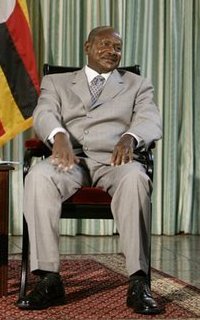Ugandan president distances himself from anti-gay bill
Thursday, January 14, 2010
The president of Uganda, Yoweri Museveni, has distanced himself from a controversial bill in the Parliament that would make certain acts of homosexuality punishable by death. Until President Museveni publicly spoke out, this proposal was widely supported by the ruling majority party, the National Resistance Movement (NRM), and, as a result, was expected to easily pass with a significant number of votes in its favor.

Image: White House photo, Paul Morse.
In a nation where homosexuality is already a criminal offense punishable by up to fourteen years in jail, this bill would raise that penalty to life in prison. It would also dole out the death penalty for any offense categorized as "aggravated homosexuality"—meaning a case in which one of the participants is either a minor, HIV-positive, or a "serial offender."
Museveni stressed in this statement on Wednesday, that the Member of Parliament who drafted the legislation in question, although he is a member of the NRM, was not following government policy and did so solely as an individual.
Museveni, who admitted being at the center of widespread international criticism, said in the same statement that this matter was now a "foreign policy issue," and therefore his government, Parliament included, "must take into account [Uganda's] foreign policy interests."
Case in point, Sweden has since threatened to cut financial support to the small African nation if this bill does in fact go through. In addition, numerous other world powers over the past weeks have contacted Museveni directly to elaborate upon their objections.
Following which, a frustrated Museveni told the BBC, "The Prime Minister of Canada came to see me and what was he talking about? Gays. Prime Minister Gordon Brown came to see me and what was he talking about? Gays. Mrs. Clinton rang me. What was she talking about? Gays."
In light of all that has occurred, Museveni told his party that the issue as of today was no longer a parliamentary one, and that it is to be discussed and handled accordingly by him and his cabinet alone.
Sources
- "Uganda President Museveni wary of anti-gay bill" — BBC News Online, January 13, 2010
- Fred Ojambo. "Uganda Leader Urges Calm Among Anti-Gay Supporters" — Bloomberg News, January 13, 2010

